Understanding shared custody arrangements in Australia.
Published on Tuesday 17 June, 2025 by Robyn Nayda
Custody arrangements are not a “one size fits all” rule. They are determined by the circumstances of the family, and what is in the best interests of the children.
Two common types of custody arrangements
Custody arrangements can be categorised into two main time spending arrangements:
- Equal shared care, where children spend time with each parent on an equal, usually week about, basis; or
- Where the children have a primary carer and spend time with the other parent.

Key considerations under the Family Law Act 1975
When determining the most suitable arrangement, several factors must be considered, including:
- How best to promote the safety of the children;
- What the children’s views are;
- What the developmental, psychological, emotional and cultural needs of the children are;
- Each parent’s capacity to provide for the children’s needs;
- The benefit to the children of having a relationship with each parent, and other significant people (like grandparents and other family members); and
- Anything else that may be relevant to the children and their circumstances.
Safety first: When risk factors are involved
Safety for a child spending time with a parent is of paramount importance. Risk issues which are considered by a Court when determining a child’s safety include:
- Family violence
- Alcohol or drug use
- Mental health issues of either parent.
Listening to children: How their views are taken into account
It is important for a child to maintain a connection to their culture and community and whether either or both parents can facilitate this.
Children with specific needs, like neurodivergency, disability or mental health issues, may benefit from spending more time with the parent who can best provide for those needs.
The age factor: Custody for infants vs. older children
A child's age plays a role in determining suitable arrangements:
- Younger children will usually stay primarily with one parent (the primary carer), and spend short, regular visits with the other parent.
- As they grow older, time with the “time spending parent” can gradually increase.
We explore how children’s views are expressed in a separate blog, which you can access here.
When equal shared care works best
Equal shared parenting arrangements may be appropriate when:
- The children are older
- The parents are amicable
No fixed rules, but court guidance helps
There are no arrangements that are set in stone, but Court decisions give us guidance about what time spending is appropriate in all of the above circumstances.
We're here to help
If you would like to speak with experienced Family Lawyers about child custody arrangements, or any other issues around a separation or divorce, we're here to help guide you through the process.
Our team of lawyers in SA have helped thousands of South Australians protect their family's rights. When experience matters, we’re here to help you, too.
The content of this article is intended to provide a general guide to the subject matter. Specialist advice should be sought about your specific circumstances.

Author
Robyn Nayda
Senior lawyer
Found this helpful? Share it!
Read our news and ideas by Practice Area
- Aboriginal land rights
- Agricultural law
- Asbestos claims
- Car accident claims
- Commercial and property law
- Contested wills and estates
- Conveyancing
- Criminal law
- Defamation
- Divorce
- Employment law
- Estates
- Family law
- Injury claims
- International law
- Litigation and dispute resolution
- Public liability
- Renewable energy law
- Super TPD
- Wills and succession planning
- Workers' compensation
Related posts...
Your guide to workers’ compensation claims
If you or a loved one has been injured at work, it can be challenging to navigate a workers’ compensation claim – especially during recovery. Keep reading to learn about your legal rights and entitlements.